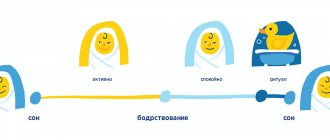Most often, a child's gums itch when baby or molar teeth begin to emerge. Some parents may assume that this process occurs at a fairly early age, 2 - 3 months, but sometimes it happens later. Read more in our article:
Sometimes the child experiences very strong painful sensations. If parents do not know how to help him, the situation becomes more complicated. There is no need to panic, the main thing is to understand the reasons for the baby’s condition. The child needs to be somehow distracted from the obsessive state, play with him, and provide first aid in the meantime.
Symptoms of sore gums
Each child experiences teething differently. The most characteristic symptoms are:
- inflammation of the gum tissue, itchy condition;
- excessive secretion of saliva (the mucous membrane secretes biological fluid to protect the inflamed area from greater damage);
- capricious behavior (the baby cries due to obvious discomfort in the oral cavity);
- disruption of the normal nature of sleep.
Other symptoms that are less common, but also characteristic of teething, are:
- increased body temperature;
- headache;
- intestinal problems (diarrhea, constipation);
- nausea, vomiting;
- difficulty breathing;
- cough.
Such conditions of the baby can seriously frighten parents. The best way out of the situation is to visit a pediatrician. In this case, a comprehensive examination of the child will be carried out, an accurate diagnosis will be made, and the medications required to be taken will be prescribed.
Itching during teething
Most children are born without teeth. And many babies endure the period of teething painlessly, but some newborns face painful sensations when their gums itch. Discomfort during teething is caused by inflammatory processes in the oral cavity and the mucous membrane of the gums.
The tooth, moving towards the exit from the gum, goes through several stages. In this case, the infant experiences the following symptoms:
- excessive salivation;
- redness;
- swelling;
- small hematomas.
Each stage of teething is accompanied by severe itching of the gums. A week before the tooth shows itself, sometimes small hematomas appear in the form of bluish tubercles. At the same time, any glimpses of teething on the gums should not bother parents. The hematomas will resolve on their own, the redness and swelling will also go away when the tooth comes out.
Parents may feel that their newborn is behaving very strangely. Because children become unbearably capricious and restless. They cry often and have trouble sleeping. They may begin to bite and squeeze the breast tightly with their gums while sucking. There is nothing unnatural in the actions of infants, so mothers have nothing to be afraid of. The baby’s gums are simply itching wildly, he may be scared himself, because this is the first time he has encountered such unpleasant sensations.
Why do my child's teeth itch?
Smooth, moist, light pink gums are healthy. If it looks different, and there is bleeding in the mouth and an unpleasant odor is felt, the baby begins to be capricious, stops eating, and constantly scratches his teeth. In such a situation, parents should know the main sources of itching. Children's gums begin to itch for various reasons.
Allergy
A child may experience itching in the gum area when brushing their teeth with unsuitable toothpaste or eating exotic foods. Teenagers may experience an allergic reaction to installed braces.
Dental diseases of the oral cavity
Children often do not understand that it is important to practice oral hygiene, they are in a hurry when brushing their teeth or even skip this procedure in the evening.
As a result of this attitude, various gum diseases can develop. Most often, children experience the same dental diseases as adults: gingivitis, stomatitis, etc.
When itching of a child's teeth is accompanied by throbbing pain, there is a possibility of pulpitis.
Gingivitis occurs during eruption. Plaque forms and increases on the teeth, the gums turn red, and bleeding occurs. With stomatitis, blood or bluish smears, pain in the soft tissues of the mouth, and blisters appear.
Lack of vitamins
When a child does not eat enough vegetables and fruits, his body does not get important nutrients. Itchy teeth may be due to a lack of vitamin C and calcium. And the consequences of such a shortage are bleeding gums, destruction and loss of teeth (scurvy).
Other reasons
- The child is cutting a tooth. Before the age of one year, babies begin to put various objects in their mouths to scratch their teeth. At the same time, their gums may swell and bleed. Such signs appear when the baby cuts a tooth. Additional features may include high temperature, strong salivation, and clear snot. In this situation, a teether comes to the rescue. It is first frozen and then given to the baby. Ice has an analgesic effect on the gums, which begin to itch less. If the itching does not stop, then parents should consult a pediatrician to choose a medicinal ointment.
- Fungal disease. The gums may itch when a white coating develops in the mouth, which appears due to thrush (candidiasis). This fungal disease often occurs in children who taste the surrounding objects. Thrush is the result of weak immunity. To treat this disease, white plaque on tissues is often treated with a soda solution and antifungal drugs are taken while following a diet.
- Other diseases. Teeth begin to itch during colds, if swelling occurs in the mouth. In some children, weather sensitivity manifests itself through itching. If the teeth do not stop itching after long-term treatment, dentists conduct additional research and carefully study the baby’s tests. As a result, a change in composition or acidity is detected in the saliva, to which the increased immunity reacts with itching.
Teething: symptoms in a four-month-old baby
The signs that accompany the appearance of baby teeth are very diverse and sometimes similar to the course of other diseases. They indicate enormous stress for the body and decreased immunity, and this in turn can lead to various diseases.
It is the observation and attention of parents that will help make the correct diagnosis.
Salivation
Saliva enzymes have an irritating effect on the baby's delicate skin, which manifests itself in the form of red spots. The baby becomes irritable and nervous. It is necessary to rinse the face and chin with warm water and dry easily with blotting movements. Do not rub with hard towels or napkins. To soften the skin, treat it with baby cream, almond or coconut milk.
When teething, babies experience not only itchy gums, but also increased salivation.
Swelling of the gums
The appearance of bumps on the gums means that a tooth will appear in a week. After that, all swelling on the gums should resolve on their own without any medical action.
Most likely, a cough and runny nose are caused by an excess of saliva. There is no need to rush to give medications or put pharmaceutical drops in your nose. If your baby has no other symptoms of a cold or flu, then after the tooth appears, these symptoms will disappear on their own.
Temperature
When teeth erupt, the gums become inflamed, which leads to a rise in temperature. General rules apply here on how and when to shoot it down.
Children often develop a fever when teething
"Everything in the mouth"
Sometimes teething can be accompanied by aching pain. The baby becomes restless and capricious. He often wakes up in the middle of the night and does not sleep well during the day. The sleep-wake pattern is disrupted, so parents need to be patient and understanding about night awakenings.
The child may be fussy and have difficulty sleeping
Eating disorder
The child’s teeth and gums “itch”; he wants to relieve the unpleasant sensation and may greedily grab the nipple of a bottle or breast. At the same time, the discomfort in the gums only intensifies, and the child immediately refuses to eat, cries, and is capricious. To feed him, you will have to do this more often.
Constipation and diarrhea
Your baby may have constipation or diarrhea
Here's what you need to do to prevent baby teeth from developing.
- Ensure the cleanliness of everything related to the child.
- Set up the correct diet - your child’s diet must include solid vegetables and fruits.
- Eliminate sweets from the menu.
- From the age of 1.5-2 years, start teaching your child to use a toothbrush. So that the child does not resist, but happily carries out this procedure, it is advisable to turn the training into an interesting game.
- Apply the above-described traditional methods to prevent diseases.
- When the first symptoms of the disease appear, contact your pediatric dentist. Do not self-medicate. Timely detection of the disease speeds up the recovery process and reduces the risk of complications.
Parents should take good care of their baby's teeth
What to do
Parents should always ensure that their child brushes their teeth thoroughly in the morning and evening after meals.
If your gums still start to itch, you should immediately purchase a brush with soft bristles and medicated paste.
This way you can determine whether the itching is an allergic reaction of the body.
You also need to pay attention to the foods your baby eats. Introduce more fruits and vegetables into your diet, this is especially important in the spring. Serve only warm food, because... hot increases gum irritation.
After brushing your teeth, rinse your mouth with herbal decoctions and medical solutions.
Helping your baby with itchy gums
There is no way to speed up the process of teething when a child’s gums itch at 4 months or to prevent pain during this process. But it is quite possible to reduce the pain that babies feel when teething.
Methods to relieve itching:
- Relieving massage. It is recommended to do massage with safe and cool material. A cotton swab dipped in cool water is suitable for this. Before the massage, you should wash your hands thoroughly. Movements should be soft and careful; sharp or strong pressure on the gums is prohibited. Massage will not only reduce itching, it will also cleanse your mouth.
- Various teethers. To relieve itchy gums, it is better to use teethers with fillers to scratch them. It is advisable to cool them before use. Cold helps relieve pain and burning. Special means for scratching the gums speed up the appearance of teeth.
- Pacifiers. The child’s gums can be scratched with toys. For these purposes, it is necessary to scrupulously approach the choice of pacifiers. It is important to avoid using toys that are coated with varnish and paint or have small or pecking parts. You can also use any object made of strong and safe material that a 4-month-old child will not be able to chew into small pieces and will choke on them. Parents should know that if a newborn damages his delicate gums, he may contract some kind of infection with the subsequent development of stomatitis.
- Various infusions. Chamomile decoctions, which should be used to wipe the entire oral cavity, help reduce inflammation. You can simply rinse your mouth with the medicinal tincture and even give it to your baby to drink. You can dip a tampon or bandage into it and apply it to the inflammatory area.
- Gel for teeth. Medicines that relieve pain symptoms can be purchased at any pharmacy. Such medications are based on anesthetic substances and must be used strictly according to the instructions.
- Safe products and other items. When teething, a child can scratch his gums with various foods. Completely clean raw carrots, as well as frozen bananas, are suitable for this. Long vegetables and fruits easily reach the corners of the gums, which bother the baby the most. Naturally, a small child should not be left alone with food for a long time; he must be monitored so that he does not choke. You can also give children a chilled spoon or even a frozen cloth to chew. Basically, teething accompanies the period of introducing complementary foods. This means that teeth begin to appear more often in children at six months of age. If the gums of a 4-month-old child itch, then you should not use sedatives in the form of food.
Rinses to help relieve itching
Teeth stop itching if you treat the oral cavity with solutions containing soda or salt.
In folk medicine, decoctions are used:
- sage;
- oak bark;
- chamomile flowers.
A tablespoon of herbs is poured into a glass of boiling water and cooled to room temperature. The resulting decoction is filtered and used for rinsing the mouth. The procedure should be performed up to 6 times a day.
It is usually difficult for children to explain what is bothering them, so parents should themselves examine the baby’s teeth, gums and tongue from time to time. If, during such an examination, an adult discovers signs of illness in the child’s mouth, then you should immediately contact a dentist.
How often do you look into your baby's mouth? Many parents are sure that it is enough just to control that the child is not lazy to brush his teeth before bed and in the morning. And some don’t even have time to do this. Otherwise, adults follow the logic: since the child does not cry and eats ice cream with a wide smile, then everything is fine.
But, for example, gingivitis in children can be almost painless. At first. But if the sore is neglected without paying attention to it, there is a risk of facing very, very unpleasant consequences - even losing teeth!
Let's figure out what kind of illness this is, how to detect it and cure it.
About the formation of teeth in babies
The process of tooth formation can begin as early as one month of age, but most often this occurs at 2-3 months. The appearance of a child’s first teeth is a joyful event in the life of the whole family, but at the same time it brings a lot of excitement for parents. Children experience the period of teething differently. For some this is very painful, for others the first tooth appears unexpectedly, without any symptoms.
Babies' teeth most often erupt in pairs.
A child's first tooth most often erupts at 6 months of age. At one year old, a baby may already have 8 teeth. After a year there is a break in this process for several months. Then the molars begin to appear - first the lower ones, then the upper ones. Around the age of 2-3 years, the child already has all 20 baby teeth.
At first, baby teeth may be positioned asymmetrically
For any sick person, the support and love of loved ones, their understanding and sympathy is very important. What can we say about a small child! He needs the love and affection of his parents more than ever. If the baby asks to be held in your arms, you should not refuse. You can distract him from his suffering with interesting walks and new toys. There is no need to be angry, but to treat the baby’s problems with understanding.
About teethers
For severe gum irritation, special gels are used to lubricate the gums. Their action is to cause slight numbness of the gums, itching and other unpleasant symptoms weaken. To choose a drug, it is advisable to consult a doctor, since there are a lot of them in pharmacies. For example, the dental gel "Cholisal" has an anti-inflammatory and analgesic effect.
"Holisal"
Itching may also occur for another reason, and not be a symptom of teething. If you have the slightest suspicion of any pathology, you should consult a doctor for advice and begin treatment.
- Antihistamines are taken for gum irritation due to allergies. Irritating factors must be identified and eliminated. They can be food, oral care products and others.
- Drugs with a sedative effect are prescribed for itching of the gums, the cause of which is a psychological disorder.
- Fungal infections of the oral cavity are treated with antiseptics and antibiotics.
- Antiseptic and non-steroidal drugs are used to treat dental diseases.
The doctor may prescribe certain medications that are not harmful to the baby
| Means | Description |
| Cold | The best cure for itchy gums is cold. You can give your child a cold apple or carrot to chew on. But if the child has at least one tooth, then this cannot be done. He can take a big bite. In this case, chilled fruit puree or yogurt will be healthier. A safe option is to use teethers with a cooling effect. |
| Using chamomile flower infusion | To relieve pain in the gums, this remedy is effective: moisten a cotton napkin in an infusion of chamomile flowers and cool in the refrigerator. If you give it to your baby to chew, the pain will soon calm down. Preparation of chamomile tincture: pour two or three tablespoons of flowers with a glass of boiling water and infuse for an hour. |
| Soda and salt solutions | An aqueous solution of soda or salt copes well with itching. Soak gauze or bandage in the product and wipe the gums with a light massaging movement. |
| Decoctions and tinctures of medicinal herbs | The same procedure can be done with tinctures or decoctions of medicinal herbs. To prepare them, oak bark, calendula, and St. John's wort are used. All of them have antiseptic properties. How to make decoctions? Add 1 tablespoon of bark or grass to 0.2 liters of water and boil over low heat for 15 minutes; after cooling, strain. Bacterial plaque is well removed by propolis tincture. You can combine the antimicrobial properties of herbs with cooling. To do this, freeze the sage infusion in an ice tray and use ice cubes to rub your gums. |
| Decoctions for rinsing | For older children, tinctures and herbal decoctions are prepared for rinsing the mouth. You can use eucalyptus or tea tree essential oils by adding a couple of drops to the rinse water. For the same purposes, use aloe or celandine juice. |
Folk remedies can ease baby's discomfort
Symptoms of gingivitis in children
Gingivitis in children is an inflammatory disease that affects the gum tissue adjacent to the teeth and located in the spaces between them. Remember: have you ever noticed blood on your toothbrush? This is just one of the first symptoms of gingivitis. This also includes: redness and swelling of the gums, pain during brushing, gum hypertrophy (overgrowth), high fever.
“There are five types of gingivitis: catarrhal, ulcerative-necrotic, hypertrophic, atrophic, desquamative,” lists pediatric dentist Suleiman Ibragimov. – And each has its own symptoms. For example, catarrhal gingivitis may not manifest itself in any way, except that when brushing your teeth, weakened gums begin to bleed. With other variations of the disease, everything is more serious.
During ulcerative necrotic gingivitis, the gums itch and hurt. In addition, the temperature may rise and the lymph nodes may become inflamed. The process is accompanied by general malaise and increased salivation, and after a while ulcers appear and gum tissue begins to die.
Hypertrophic gingivitis in children, symptoms: gums increase in size, bleed heavily, pain develops into constant pain. The hypertrophied tissue gradually grows so much that it “crawls” onto the teeth. Well, underneath is the kingdom of pathogenic microflora, which is extremely difficult to combat.
Atrophic gingivitis in children manifests itself in the fact that the teeth become very sensitive, as the gums seem to be depleted, decrease in volume, and the necks of the teeth and even the roots are exposed. According to Suleiman Ibragimov, at this stage the disease enters its most severe stage: it is no longer gingivitis, but practically periodontitis, that is, the process moves to the jaws.
The appearance of desquamative gingivitis is indicated by purulent blisters on the surface of the gums, as the upper layer of the mucous membrane is destroyed.
Causes of itching
1. If you are allergic to hygiene products. Itching can be caused by dentures, or rather by the material from which they are made.
2. Diseases of the oral cavity that can cause discomfort accompanied by itching:
- periodontitis and periodontal disease;
- hyginitis;
- stomatitis;
- candidiasis;
- leukoplakia.
3. People who do not adhere to a healthy diet may develop a vitamin deficiency in their body, which will lead to itchy gums.
4. Nervous disorders. A person may experience a condition where he feels like his teeth are itching. This usually occurs with a mental disorder or severe depression.
5. Dental problems, which include:
- plaque and tartar, which occur due to poor oral hygiene. Or due to disruption of the endocrine system;
- night grinding of teeth (bruxism), which wears away the enamel of the teeth and injures the gums;
- after tooth extraction, when during the healing process of the hole of the extracted tooth, new tissue grows.
Treatment of gingivitis in children
“In children suffering from gingivitis, as a rule, at the appointment we find a thick layer of plaque and hard deposits, as well as caries that affects many teeth at once,” notes Dr. Ibragimov.
A key role in the development of gingivitis is played by bacteria that multiply in dental plaque. In addition, the appearance of sores is facilitated by: infections (such as acute respiratory viral infections or chronic tonsillitis, for example), allergic diseases, hypovitaminosis, diabetes, problems of the digestive system, and so on. If your child has an incorrect bite, the child diligently avoids the toothbrush or brushes his teeth incorrectly - all this can also affect the occurrence of gingivitis.
Have you noticed your baby’s gums are red and slightly swollen? This may already be the first call. And coupled with a high temperature indicates a serious inflammatory process. See a doctor urgently! Until this moment: bed rest, drinking plenty of fluids, if necessary, antipyretic drugs (Ibuprofen, Paracetamol).
– Gingivitis must be treated comprehensively, taking into account the individual characteristics of each little patient. To begin with, find and eliminate the cause: for example, cure caries, tonsillitis (other common diseases), or deal with malocclusion pathologies, says Suleiman Ibragimov.
Then comes the treatment of gum inflammation itself. It is carried out in stages:
- removal of soft plaque and hard dental deposits;
- a course of anti-inflammatory procedures: rinsing the mouth with antiseptics (for example, Miramistin) and herbal decoctions (eucalyptus, sage or regular chamomile are suitable). You need to rinse your mouth after each brushing of your teeth, twice a day. For the youngest (who do not yet know how to rinse their mouth, and there is nothing to clean there yet), the doctor will prescribe applications with a gel containing cetalkonium and choline salicylate, plus treatment of the oral mucosa with antiseptics.
- additionally: vitamins, limit carbohydrates, enough fruits and vegetables.
“The duration of treatment depends on the form and severity of the disease,” explains Suleiman Ibragimov. — In the initial stage, the development of gingivitis in children can be stopped in 5-7 days. A severe form of the disease will have to be treated for about a month.
What to do if your child’s gums are itchy and itchy?
If the discomfort is caused by an allergy, it is necessary to undergo comprehensive tests for various types of irritants. Most often these are exotic fruits, red-colored vegetables or chicken meat. In this case, parents should maintain a light diet that will help remove toxins from the intestines.
To prevent the gums from itching, the child is given antihistamines: Zodak, Claritin, Suprastin, Fenistil.
If you suspect gingivitis, it is better to immediately contact a periodontist. He will select treatment based on the age of the baby and help alleviate the condition of itchy gums. Inflammation is usually caused by bacteria, which are abundant in plaque on enamel.
Therefore, the first step is always to cleanse the oral cavity of stones and accumulations of food debris. In preschool age, gentle ultrasound and a special light polishing technique are used.
To relieve itching in the gums, it should be treated with special gels. They contain a small percentage of anesthetic components that quickly freeze the irritated area and relieve the baby from discomfort.
The most effective and safe drugs for children over 3 years of age:
- Kamistad;
- Kalgel;
- Holisal;
- Dentol;
- Dentinox N.
According to the instructions, they must be applied in a thin layer, gently rubbing into the mucous membrane. Antiseptic rinses with solutions of Chlorhexidine or Miramistin are recommended for children over 5 years of age.
You can offer irrigation of the oral cavity with Chlorophyllipt, using an oil-based product without alcohol. If the baby’s gums are itchy, parents should wipe the mucous membrane with a cotton swab dipped in antiseptic or chamomile decoction and apply compresses with sea buckthorn oil.
Here, look what Dr. Komarovsky recommends!
Periodontists do not recommend using untested folk methods and compositions in young children. They will not be able to rinse the mouth properly, and most of the liquid will be swallowed. This can cause intestinal problems, poisoning or allergies. During treatment, the child is switched to a diet with soft cereals and purees to eliminate severe pain and additional itching and reduce discomfort.
This can cause intestinal problems, poisoning or allergies. During treatment, the child is switched to a diet with soft cereals and purees to eliminate severe pain and additional itching and reduce discomfort.











